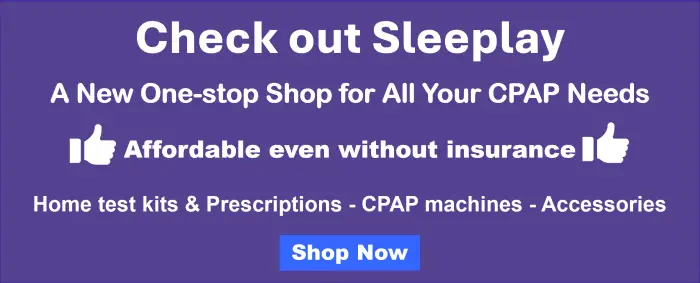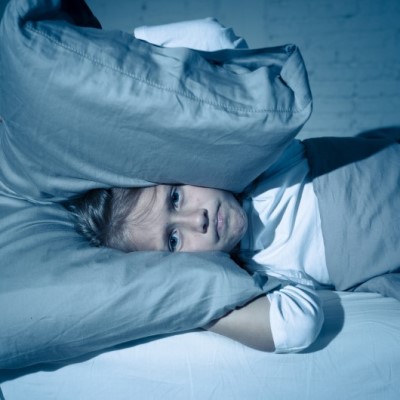
7 Sleep aids for kids worth a try and other things to think about
By Jason Wooden, PhD | March 7, 2021
While prescriptions meds are a popular remedy to help kids sleep, they come with many downsides including unpleasant side effects and the risk of dependence.
Depending on your situation, your alternatives for sleep aids for kids include natural supplements, aromatherapy, soothing music, weighted blankets, massage, and white noise.
It’s also important to practice good sleep hygiene and to deal with any underlying emotional, psychological, or medical issues.
Kids aren’t getting enough sleep and we’re all paying the price
So, you’re interested in sleep aids for kids?
It’s understandable you would want a few more options to make your nights easier.
Nothing is more frustrating than kids wide awake way past their bedtime. Awakenings during the night are just as bad.
They don’t get the sleep they need which often means you’re not getting the sleep you need.
The American Academy of Sleep Medicine recommends that kids 6 yrs. or younger get 10 to 14 hours of sleep and that older kids get 9 to 12 hours of sleep.
Unfortunately, a quarter of children under the age of five in the US don’t get adequate sleep. Almost half of school age children don’t get enough sleep during the week.
That’s a lot of kids behind the eight ball on sleep.
How much sleep does your kid need?
Newborns: 14-17 hours
Infants: 12-15 hours
Toddlers: 11-14 hours
Preschool: 10-13 hours
School-age: 9-11 hours
Source: National Sleep Foundation
And when kids don’t get enough sleep, they pay a price which can include:
- mood and behavioral problems
- poorer focus
- poorer performance at school
- increased risk for anxiety and depression
- increased risk for immune system related issues
You know who else pays a price? Yep, we parents do.
All that extra stress from dealing with sleep-deprived kids and losing out on our own sleep adds misery to daily life for everyone.
Tough days at work, more fuss during the evening, and another frustrating night to look forward to.
The reasons why kids struggle with sleep are varied ranging from behavioral to medical issues.
Regardless of why it’s happening, you need to know what you can do to get things back on track.
Let’s take a look at why sleeping pills may not be the answer, alternatives you can try as a sleep aid for kids, and what else you can do to for better nights.
Why sleeping pills should be your last resort as a sleep aid for kid
Sleeping pills are a popular remedy for insomnia due to their convenience and fast acting effects.
They’re also popular for use as a sleep aid for kids.
One study found that 81% of doctor visits among children with sleep difficulties resulted in a prescription for medication. Some of the meds commonly prescribed include antihistamines, antidepressants, and sleeping pills such as Ambien.
The problem is that none of these meds have been tested and approved in the US for childhood insomnia. They just aren’t made for children.
So, while a doctor can prescribe these medications for off-label, it’s important to keep this in mind.
You should also know that prescription sleep meds come with unpleasant side effects, including headaches, constipation, gas, dizziness, and daytime fatigue.
Other risks to keep in mind include:
- they can be habit-forming
- sleepwalking
- developing a dependence on them
- rebound insomnia after withdrawal
For all of these reasons, it’s recommended that you use these medications carefully as a LAST RESORT and SHORT-TERM REMEDY under the supervision of a doctor.
Be sure to ask about dosing, side effects, and possible alternatives.
They’re plenty of other things you can do, so let’s take a look at them.
7 Sleep aids for kids worth a try
Since the reasons kids struggle with sleep are so varied, there are lots of different things you can try as sleep aid depending on your situation.
Many of the options listed below can help make it easier for your kid to fall asleep by helping them relax or improving their sleep environment.
When it comes to your child’s health and safety, remember the first rule is to do no harm as you try out new sleep aids for kids. You can always check with your pediatrician.
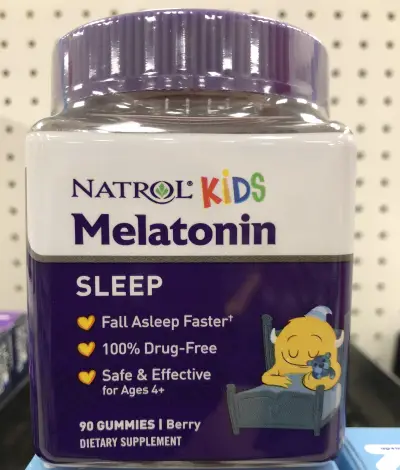
1) Melatonin supplement
Melatonin is a hormone produced by the body that helps control your sleep-wake cycles. It rises in the night and falls in the morning.
While it doesn’t work for everyone, synthetic melatonin is one of the most commonly used natural sleeping aids for insomnia. Be sure to talk to your pediatrician about the best time and dose for your kid.
Learn more:
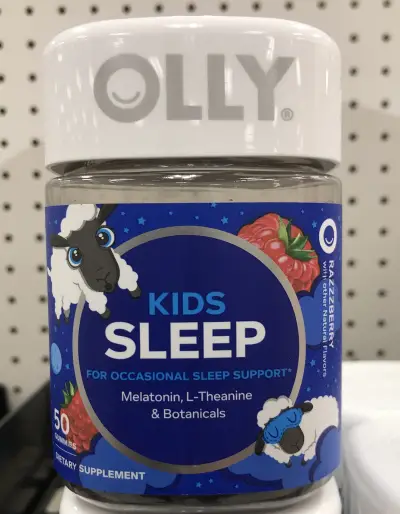
2) Natural supplements
Melatonin isn’t the only natural supplement used for sleep. You can find a variety of natural sleep aids for kids containing herbal ingredients, minerals, and vitamins that promote sleep.
Some of the ingredients help with stress and anxiety, one of the biggest issues for falling asleep. Other ingredients may more directly affect the body’s sleep process.
It’s not uncommon to find these ingredients combined with melatonin.
Keep in mind most natural supplements haven’t been tested and approved like traditional medications. Because of this, it’s recommended you check with a complementary health specialist (i.e., naturopathic physician, alternative medicine practitioner) about the best form, dose, and brand.
Learn more:

3) Aromatherapy
Calming scents like extracts prepared from the flowers of the lavender plant can help reduce anxiety and promote relaxation. Other essential oils can help with nausea or pain.
Keep in mind these extracts are highly concentrated and can be harmful if ingested or applied directly to the skin. They are also flammable.
To be safe, it’s a good idea to check with your doctor, a complementary health specialist, or an aromatherapy expert about the best way to use aromatherapy extracts with your child.
Learn more:
How Aromatherapy Can Help Children
Are Essential Oils Safe for Children (Johns Hopkins All Children’s Hospital)
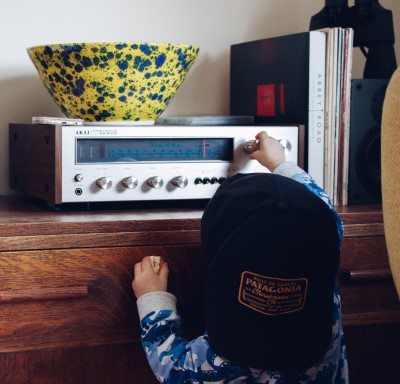
4) Bedtime music
The right music can create a relaxing environment for your kid. Soothing music such as quiet classical tracks can help the body relax and make it easier to fall asleep.
(It goes without saying the wrong music can keep them up even later.)
Music with slow and stable rhythms, low frequency tones, and relaxing melodies is recommended. Your options include lullaby tracks and sleep tracks.
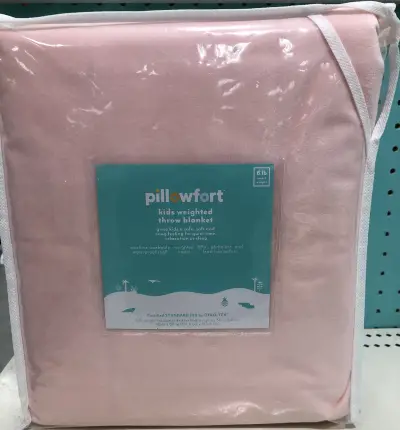
5) Weighted Blankets
These blankets are the talk of the town these days. They’re filled with materials to make them heavier than your normal blanket.
The heaviness is believed to provide a sensation similar to deep pressure stimulation which has been shown to help with anxiety, restlessness, and insomnia.
Since some can weigh as much as 35 pounds, it’s important to check with your pediatrician about which weight size is safe for your child.
Learn more:

6) Massage
Massage is another option that may help calm an anxious or overactive kid at bedtime.
Did you know studies have found massage to be beneficial for insomnia-related stress, anxiety, headaches, and pain?
Learn more:
Your Child and Sleep: How Regular Massage Can Help (Boomeranghealth.com)
Infant massage (Mayo Clinic)
Video: Simple Massage for Children
Video: 3 massage techniques to help your kids with anxiety, attachment, relaxation

7) White noise
This is basically noise that contains all the hearable sound frequencies combined together, similar to how white light contains all the colors of the light spectrum.
The way it helps sleep is by reducing the difference between regular background noise in your environment and sounds such as a door slamming that can arouse you out of sleep.
So, if your kid has trouble falling asleep or staying asleep because of intruding sounds, white noise can help mask it. Some people actually find the sound white noise comforting.
You can try an old fashion household fan or a white noise machine. (You can find a couple of options listed here.)
It’s important to make sure the volume is not too loud so that you don’t damage your child’s hearing. Based on a 2014 study by American Academy of Pediatrics, you should also be extra careful with infants so that you don’t increase their risk of problems with language and speech development.
Learn more:
Best fans for white noise
Some white noise machine options
Some things to keep in mind about trying out new sleep aids for kids:
- Not every option is right for every situation
- You may have to combine sleep aids based on your kid’s specific sleep issues
- Be patient and willing to try different things
With any sleep aid there’s the risk that your child may become overly reliant on it. If that’s the case, a sleep coach can help you figure out ways to teach your kids to self-soothe and put themselves to sleep.
Don’t stop with sleep aids for your kid
There are plenty of other things you can do to help keep your child’s sleep on track.
Unfortunately, there are so many different things that affect sleep and could be making your child’s sleep situation worse. That’s why sleep hygiene is important.
It’s the everyday things your kids does during the day and at night that can make a big difference for their sleep.
Some everyday things that can help include:


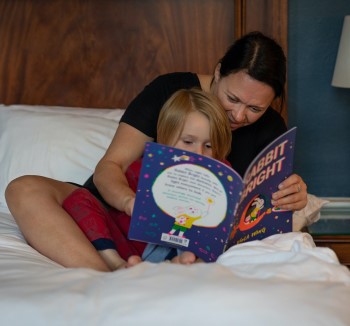


Consistent go to bed and wake up times:
Experts recommend maintaining regular bedtimes and wake up times to keep the sleep-wake clock on schedule. Kids should be discouraged from staying up late and sleeping in on weekends.

Keep their bedroom dark, quiet, and comfortable:
For optimal sleep, experts recommend that bedrooms be kept dark, quiet, and cool. If they’re scared of the dark, try a sleep friendly amber night light.
You may need dark out curtains for excessive outdoor light or white noise to block out surrounding nuisance sounds.

Limit electronic device use before bedtime:
Smart phones, tablets, and TV screens emit bright blue light which has been shown to interfere with the body’s natural sleep-wake cycles. Similar to natural daylight, the bright light tells the brain to wake up.
Depending on what your kid is actually doing, these electronic devices may also get them more wired up at night. Some experts recommend that your children’s bedroom be a no screen zone.

Keep pets out of the bed:
Okay, this one likely depends on whether it’s actually a problem. There’re definitely pros and cons for it.
Some kids actually find comfort in having the family pet in their bed or bedroom. On the other hand, does your dog move around a lot, wake up and bark at odd hours, or requires regular late night potty break?
If your dog is disturbing your kid’s slumber and you’re in a battle to get their sleep back on track, you may want to make a change.
Sleep aids may only help your kid so much if you ignore underlying issues
Did you know there may be emotional, psychological, dietary, and medical issues making it harder for your kid to sleep?
Some of the issues that affect kids sleep are:
- stress, anxiety, or depression
- bedtime fears
- nightmares
- life changes
- behavioral issues (ADHD, bipolar, etc.)
- stimulants (caffeine)
- medical conditions
- sleep disorders
- medications
While sleep aids for your kid may help, they will not resolve many of these underlying issues.
If your kid continues to struggle with sleep, it’s well worth it to schedule a visit with your pediatrician in case there are things going on beneath the surface.
They can check for medical and mental health issues you’re overlooking. (You would be surprised at the things linked to insomnia in kids.)
They can also check for medications linked to sleep issues and refer you to a sleep specialist if they suspect your kid has a sleep disorder such as sleep apnea, night terrors, or restless leg syndrome.
Finally, they may also refer your child to a therapist to deal with mental health and behavioral challenges for their sleep. For adults, counseling is one of the most effective treatments for insomnia and evidence is growing that it’s just as helpful for kids too.
Sources:
1. “AAP Supports Childhood Sleep Guidelines”, 2016, American Academy of Pediatrics website
2. Sleep Regulation, Physiology and Development, Sleep Duration and Patterns, and Sleep Hygiene in Infants, Toddlers, and Preschool-Age Children, Curr Probl Pediatr Adolesc Health Care. 2017 Feb;47(2):29-42.
3. “Only half of US children get enough sleep during the week”, 2019, ScienceDaily
4. “Children and Sleep”, Sleepfoundation.org
5. Trends in Medication Prescribing for Pediatric Sleep Difficulties in US Outpatient Settings, Sleep. 2007 Aug 1; 30(8): 1013–1017.
6. “Avoid Sleeping Pills for Children with Insomnia”, 2015, Choosingwisely.org
7. “Understanding the Side Effects of Sleeping Pills”, 2020, Webmd.com
8. “Learn the risks of sleep aids”, 2017, Harvard Health Publishing
9. “How Aromatherapy Can Help Children”, 2018, Children’s Hospital of Philadelphia website
10. “More Than Just a Fad: 4 Ways Weighted Blankets Can Actually Help You”, 2019, Penn Medicine
11. “Massage Therapy for a Better Night’s Sleep”, 2014, Sleepreviewmag.com
12. “What Is White Noise?”, Sleepfoundation.org
13. “Can Infant Sleep Machines Be Hazardous to Babies’ Ears?”, 2014, American Academy of Pediatrics website
14. Infant Sleep Machines and Hazardous Sound Pressure Levels, Pediatrics March 2014, peds.2013-3617
15. “Sleep Strategies for Kids”, Sleepfoundation.org
16. “How much physical activity do children need?”, CDC website
17. “What are the symptoms of insomnia in children?”, Boston Children’s Hospital website
18. “Children and Sleep”, Sleepfoundation.org
19. “CBT for Children: 14 Ways Cognitive Behavioral Therapy Can Benefit Kids”, 2021, Positivepsychology.com
Connect with us:
About Us
Better Sleep Simplified® was founded as a place for you to get clear and well-researched information.
Our goal is to make sure you know about your options so that you take action sooner rather than later.
Check us out on YouTube:
Watch and Learn
Helpful sleep tips, interesting sleep facts and statistics you want to know about
Affiliate Disclosure
This site is a participant in the Amazon Services LLC Associates Program and other affiliate advertising programs designed to provide a means for sites to earn advertising fees by advertising and linking to them.
Important: BetterSleepSimplified.com is for informational purposes only and is not intended or implied to be a substitute for professional medical advice, diagnosis, or treatment. Always consult a physician for sleep and health concerns. See additional information.

